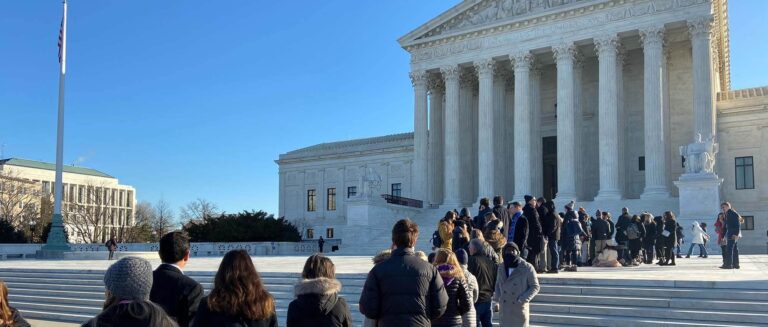WASHINGTON (CNS) — During oral arguments Jan. 22 about the constitutionality of excluding religious schools from a scholarship aid program, a divided Supreme Court seemed like it might lean toward finding a way to allow religious schools to participate.
The hourlong argument focused on potential religious discrimination when the state of Montana excluded religious schools from its tax credit program, but it also questioned if the exclusion of religious schools was even an issue since the program was shut down by the state’s Supreme Court in 2018.
“I am having trouble seeing where the harm in this case is,” said Justice Elena Kagan, adding: “There is no discrimination at this point going on” since the program ended.
But focusing on how the program cut out religious schools before shutting down, Justice Samuel Alito questioned the state’s lawyer, Adam Unikowsky, saying: “It’s permissible to discriminate on the basis of religion. That’s what you’re saying.”
The case, Espinoza v. Montana Department of Revenue, was brought before the court by three Montana mothers who have been sending their children to Stillwater Christian School in Kalispell with the help of a state scholarship program.
The program, created in 2015, was meant to provide $3 million a year for tax credits for individuals and business taxpayers who donated up to $150 to the program. It was helping about 45 students and just months after it got started, the Montana Department of Revenue issued an administrative rule saying the tax credit donations could only go toward nonreligious, private schools — saying the use of tax credits for religious schools violated the state’s constitution.
The mothers were represented by the Institute for Justice, the nonprofit legal advocacy group based in Virginia. Richard Komer, a senior attorney with the law firm, told the justices that the question before them was if the federal Constitution allows the “wholesale exclusion” of religious schools from a state scholarship program. His answer was that it does not.
He was asked multiple questions about whether the plaintiffs in this case even had a legal standing to be in court not only because the program is no longer in place, but also because as Justice Ruth Bader Ginsburg pointed out, the case is really more about those contributing to the tax credit program.
In 2015, the three mothers sued the state saying that barring religious schools from the scholarship program violated the federal constitution. The trial court agreed with them, but the Montana Supreme Court reversed this decision.
The court based its decision on the state constitution’s ban on funding religious organizations, called the Blaine Amendment.
Thirty-seven states have Blaine amendments, which prohibit spending public funds on religious education. These bans date back to the 19th century and are named for Rep. James Blaine of Maine, who tried unsuccessfully in 1875 to have the U.S. Constitution prohibit the use of public funds for “sectarian” schools.
These amendments got some attention during the oral argument.
Justice Brett Kavanaugh said they reflected “grotesque religious bigotry” against Catholics. Unikowsky, Montana’s attorney, argued that the state’s revised constitution in 1972 does not have “evidence whatsoever of any anti-religious bigotry.”
The amendments also were a big topic before the oral arguments began.
A Jan. 22 statement issued by two committee chairs of the U.S. Conference of Catholic Bishops said the Blaine amendments at issue in this case “were never meant to ensure government neutrality toward religion but were expressions of hostility toward the Catholic Church. We hope that the Supreme Court will take this opportunity to bring an end to this shameful legacy.”
The statement, issued by Bishop George V. Murry of Youngstown, Ohio, chairman of the Committee for Religious Liberty, and Bishop Michael C. Barber of Oakland, California, chairman of the Committee on Catholic Education, said the Montana case “concerns whether the Constitution offers states a license to discriminate against religion.”
They said the nation’s “non-establishment of religion does not mean that governments can deny otherwise available benefits on the basis of religious status. Indeed, religious persons and organizations should, like everyone else, be allowed to participate in government programs that are open to all.”
The USCCB also filed a friend of the court brief in this case, along with several other religious groups, in support of the plaintiffs, which said: “Families that use private schools should not suffer government discrimination because their choice of school is religious.”
A group of Montana Catholic school parents also submitted a friend of the court brief stressing the benefits of the scholarship program and the local Catholic schools. They said they opposed the state’s Supreme Court decision and “any law excluding parents who chose religiously affiliated schools for their children from state-sponsored student aid programs.”
The brief also said that state Blaine amendments “should be declared unconstitutional once and for all.”
“Now is the chance for this court to make clear that barring religious institutions and religion-exercising persons access to generally available public programs and benefits is ‘odious to our Constitution all the same, and cannot stand,'” the brief said, quoting Chief Justice John Roberts from the 2017 Trinity Lutheran case, in which the Supreme Court said states can’t deny religious institutions eligibility for public benefits, in this case for playground material, just because they are faith based.
The Montana case could have major implications for education-reform debates and policies, said Richard Garnett, director of the University of Notre Dame’s Program on Church, State & Society.
He said it “could remove, or at least reduce, one of the legal barriers to choice-based reforms like scholarship programs and tax credits for low-income families.”
Garnett also noted that the court’s “period of doctrinal hostility to public cooperation with religious schools was based on a misreading of constitutional history and practice, and many of the states’ no-aid provisions owe too much to 19th-century anti-Catholicism in America. It would be a good thing to complete the correction of these mistakes.”
Copyright ©2020 Catholic News Service/U.S. Conference of Catholic Bishops.


